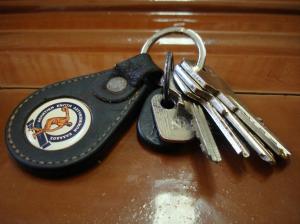Nothing diminishes a celebratory occasion quite like a citation or an arrest, and yet drinking and drug related citations typically increase from now until New Year’s Day. So, I am passing along straightforward advice, based on common questions I get from students, on how to minimize your legal risk in a variety of situations.
Tips for…
Hosting a party
- Talk to your neighbors. Letting your neighbors know about your party—and perhaps
 inviting them—opens the lines of communication and reduces the chance they will call in a noise complaint, which is the most common reason why police show up at your door.
inviting them—opens the lines of communication and reduces the chance they will call in a noise complaint, which is the most common reason why police show up at your door. - Guard the door. Know who is in your home and what they are doing. In the end, you are responsible for what happens at your residence, so if people you don’t know show up and start smoking marijuana or using other illegal drugs, you could be held responsible. Guarding the door and keeping it closed also protects you from officers coming in or seeing things that may lead to a search, a citation, or even an arrest.
- Don’t provide alcohol. If an underage person attends your party and says that you provided the alcohol, you could be charged with aiding and abetting underage consumption. If you provide alcohol to someone (regardless of age) and they leave your house and get in a car accident, you could also face social host liability charges. So, make it BYOB.
- Call 911 in an emergency. North Carolina’s Good Samaritan Law grants immunity from certain drug and alcohol possession charges for anyone who calls 911 in an overdose or medical emergency situation.
When the cops show up
- Be discreet. Keep the front door closed at all times. Once officers come to your residence, simply open the door and step outside then close the door behind you. If police come to your door and view what they believe to be suspicious or illegal activity, this could give them probable cause to search, issue citations, and even make arrests.
- Be polite. Ask, “How can I help you, officer?” If they are responding to a noise complaint, apologize for the noise and assure them that you will take action to get the noise level down. No matter what happens, always maintain a courteous attitude with the police.
- Do not consent to a search. Police must have a search warrant before they can search you (thanks to the Fourth Amendment). Without a warrant, police can conduct a search if
b) they see or smell evidence of illegal activity like alcohol, marijuana use
c) they have an arrest warrant
d) there are exigent circumstances like an unconscious person in plain view or a loud crash coming from inside the house.
If the police ask to come into your home, simply respond “I do not consent to a search.” The same goes if they ask to search any of your belongings including your car. Most people voluntarily give up their Fourth Amendment rights by consenting to searches when an officer has no warrant. Even if an officer does have probable cause, you cannot be punished for saying that you do not consent, and the burden will be on the officer to prove probable cause in court. Never physically resist police if they enter your residence or search you; just repeat “I do not consent to a search.
4. Do not incriminate yourself. If an officer asks you a question and answering honestly may incriminate you, then don’t answer (this is your Fifth Amendment right).
“Have you been drinking?” “Are there underage people consuming alcohol at this party?” “What is in your bag? Marijuana? Alcohol?” “How did you buy this alcohol? Did you use a fake ID?”—all of these questions can be answered with “I have no comment.” Make sure that you remain courteous even when refusing to answer questions. You might say, “Officer, I know you are just doing your job, but I have no comment about that/I wish to remain silent.
5. Don’t run. When police show up at a residence for a noise complaint and they see people running away, this will heighten suspicion. Most noise complaints, if handled properly, will involve a short interaction and a warning from the responding officers, so don’t give them any reason to investigate further.
On the road…
- Heed all the above advice. Being discreet in this situation means being aware of anything that may be in plain view of an officer who has pulled you over. If an officer asks you to step out of the car, then exit and lock and close your car door behind you. Do not consent to searches of your car or personal belongings or incriminate yourself. And, of course, be polite throughout the interaction no matter what happens.
- Show ID. As the driver, you are required to show your driver’s license to an officer if you are pulled over. Never show a fake ID to an officer, even if you are facing an underage possession charge. As a passenger, you should also show your real ID if asked.
- Refuse sobriety tests, but not the breathalyzer. As the driver, you can legally refuse
 to take roadside sobriety tests without any consequences (walking a straight line, touching your nose, etc.), but refusing a breathalyzer will result in an automatic revocation of your driver’s license for 1 year, whether or not you are charged with DUI. As a passenger, you can refuse a breathalyzer (whether or not you are underage) without any consequences.
to take roadside sobriety tests without any consequences (walking a straight line, touching your nose, etc.), but refusing a breathalyzer will result in an automatic revocation of your driver’s license for 1 year, whether or not you are charged with DUI. As a passenger, you can refuse a breathalyzer (whether or not you are underage) without any consequences. - Give yourself plenty of time to sober up. After a heavy night of drinking, you may be surprised at how long it takes to get back to a 0.00 BAC, the only acceptable level for under 21 drivers (0.08 for 21 and over). A 160 lb man who consumes 8 drinks will need 12 hours to get back to 0.00 (check out this chart for more info: http://www.health.arizona.edu/health_topics/aod/hourstozerobac.htm). Sleeping it off for a few hours before driving home may not be enough to avoid a DUI, especially for underage drinkers, so be sure to give yourself plenty of time to sober up before you think about driving home. Better yet, have a designated driver or plan to take a cab to and from the party.
- Never give keys to an intoxicated driver. Even if they have only had a little. Letting a less drunk person drive you home can get you charged with aiding and abetting a DUI.
Get more info on how to handle police interactions, including videos, at http://www.flexyourrights.org/. To learn more about the law or for a free (that’s right, folks, I said FREE) legal consultation, visit Carolina Student Legal Services.

No lie – I thought based on the title that this was going to be about celebrating the end of the semester (i.e. celebrations! Not citations on a paper). Whoops….Great article!
LikeLike
It’s important to be safe. Thanks for sharing this!
LikeLike
Remaining courteous is important, as belligerent behavior (even if there is no physical contact) can put you at risk of being charged with assault of a police officer. Ignorance of the law is no excuse, so understand your rights!
LikeLike
Great advice!
Thank you
LikeLike